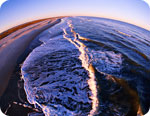
Invasive species from Fukushima tsunami washing up on U.S. shores
Saturday, June 23, 2012 by: J. D. Heyes
Tags: Fukushima, beaches, invasive species
- Newly released JFK files reveal Pentagon's role in creating Lyme disease and covid in the same lab
- Trump nominates VACCINE ZEALOT Susan Monarez to lead the CDC, sidelining RFK Jr.'s reform efforts
- BEWARE: USDA allows genetically engineered vaccines to infiltrate organic food production
- Obama accused of laundering USAID funds to fuel global protest movements, regime change operations
- Festive flavors: The sweet history, nutritional profile and health benefits of pecan pie
- Dr. Mike Yeadon releases 15-minute testimony - WATCH - about genocidal intent of COVID “vaccines”
- Elon Musk: Aliens could be here on Earth RIGHT NOW
- Analysis: The coming economic collapse, a mass uprising and Trump's three secret weapons to halt the growing revolt
- Big Pharma's media takeover: How drug companies bought the news - and your health
- Survival 101: Effective EMF blocking techniques
- Trump reverses course on Gaza plan, says “nobody is expelling Palestinians”
- California's social media censorship law struck down: A victory for free speech or a threat to online safety?
- Rep. Nancy Mace introduces bill to ban biological males from female facilities on federal property
- Big Pharma's $8 Billion bribery scheme exposed: how doctors are pushed to prescribe junk science, not heal
- HUGE: Putin claims 2020 election fraud in U.S. sparked Ukraine war, calls for peace talks with Trump
- Reclaim your health: How midlife exercise reverses years of inactivity
- Pilots report mysterious lights 'moving at extreme speeds' across Oregon skies
- Chris Rufo finally reveals abuse liberals unleashed on his wife and young kids...
- Elon Musk: Aliens could be here on Earth RIGHT NOW
- EPA advisor admits the agency is funneling billions to climate groups ahead of Trump’s return to White House
- Trump reverses course on Gaza plan, says “nobody is expelling Palestinians”
- Reclaim your health: How midlife exercise reverses years of inactivity
- A lack of integrity in Academia: Harvard professor found GUILTY of fraudulent research to promote CRT theory
- Space war brewing? Russia threatens to destroy Starlink satellites
- Big Pharma's $8 Billion bribery scheme exposed: how doctors are pushed to prescribe junk science, not heal
- Mike Adams Sermon 66: God will DESTROY ISRAEL for its wickedness
- Rep. Nancy Mace introduces bill to ban biological males from female facilities on federal property
- Survival 101: Effective EMF blocking techniques
- 5 Simple steps to boost your brainpower: How to strengthen executive function in a distracted world
- Historian warns Israel may be entering an “IRREMEDIABLE DECLINE”
- Florida takes a stand: DeSantis proposes permanent ban on mRNA vaccine mandates
- RFK Jr.'s SSRI antidepressant investigation sparks liberal meltdown, exposes Big Pharma's dangerous game
- New York politicians push bill allowing governor to indefinitely detain the unvaccinated on a whim
- Sales of survival bunkers rise following Russia’s use of the Oreshnik hypersonic ballistic missile
- Pilots report mysterious lights 'moving at extreme speeds' across Oregon skies
- Newly released JFK files reveal Pentagon's role in creating Lyme disease and covid in the same lab
- EPA advisor admits the agency is funneling billions to climate groups ahead of Trump’s return to White House
- The Health Ranger releases “Vaccine Zombie” song and music video, using AI-animated zombies for the music video
- The pandemic as a tool for INDOCTRINATION: Understanding “The Indoctrinated Brain” by Dr. Michael Nehls
- California's social media censorship law struck down: A victory for free speech or a threat to online safety?
- Dr. Mike Yeadon releases 15-minute testimony - WATCH - about genocidal intent of COVID “vaccines”
- Congratulations to the FULLY UNVACCINATED as you resisted the COVID-19 PROPAGANDA MACHINE fueled by over $100 BILLION
- Mike Adams releases country western hit single: Goin’ Back in Time is Comin’ Home
- RFK Jr. clears key hurdle: Sen. Susan Collins backs controversial HHS nominee, signaling a new era for health policy
- Mike Adams releases music poetry sensation: A Child of God
- Mike Adams releases new song and music video: Nothing More Disgusting Than a Globalist
- Unpacking the Lies That We’ve Been Fed – new song and music video released by Mike Adams, the Health Ranger
- Trump administration takes on global censorship: A new frontier for free speech advocacy
- Florida takes a stand: DeSantis proposes permanent ban on mRNA vaccine mandates
- “Why we influenced the 2020 elections”: Facebook files reveal the coordinated effort to bury the Hunter Biden laptop story
- Ex-FBI Chief EXPOSES disgraceful government coverups of Oklahoma City Bombing, Kennedy assassinations, 9/11 WTC, and "Terrorism" as plot to destroy Constitution
- Michigan sheriff announces criminal investigation into 2020 election crimes, Dominion Voting Systems
- Israeli soldiers accused of even more torture and abuse in the West Bank
- Federal judge backs Trump's mass firings, clearing path for government downsizing
- Red Cross issues warning to stop blood plasma donations from vaccinated people
- Scientists confirm: GENIUS brain function can be spontaneously unleashed in humans without any apparent cause
- EPA advisor admits the agency is funneling billions to climate groups ahead of Trump’s return to White House
- HYSSOP: What research reveals about the health benefits of this ancient holy herb
- Two containers with completed ballots fall out of truck in Florida
- Fully vaccinated about to see “tsunami” of illness and death, warns virologist
- Today I asked our AI language model “Neo” about which phytonutrients or phytochemicals can block the spike protein related to SARS-CoV-2 … Here is what it answered…
- Global leaders unite to clamp down on “misinformation” with UN-backed Cascais Declaration
- BREAKING: 2025 NDAA authorizes mandatory military draft of WOMEN across America… as Pentagon pursues global NUCLEAR war with both Russia and China at the same time
- Michael Yon warns of a ZIONIST TAKEOVER in Trump’s second administration
- BOMBSHELL: DNA testing kits are a SCAM to develop ethnic-specific bioweapons
- Ozempic and Wegovy weight loss drugs are injectable LIZARD VENOM PEPTIDES that may unleash a devastating wave of organ failure… side effects align with symptoms of SNAKE BITES
- Israeli soldiers accused of even more torture and abuse in the West Bank
- These 13 countries just signed an agreement to engineer a global FAMINE by destroying food supply
- NASA admits that climate change occurs because of changes in Earth’s solar orbit, and NOT because of SUVs and fossil fuels
- RFK Jr. clears key hurdle: Sen. Susan Collins backs controversial HHS nominee, signaling a new era for health policy
- Sermon 30: How Jesus reveals Caesar’s FAKE CURRENCY and FALSE AUTHORITY
- Coriander seeds: Ancient medicine backed by modern science
The latest danger emanating from the Fukushima complex to hit our shores came not in the form of irradiated tuna, but in the form of a boxcar-sized piece of floating dock which washed ashore along a sandy Oregon beach earlier this month. The find initially excited some beachcombers, reports said, but scientists quickly began to worry that such debris was quickly becoming a whole new way to transport invasive species - crabs, seaweed and other marine organisms - to U.S. waters, further harming West Coast marine environments, The Associated Press reported.
Worse, scientists and marine biologists suspect more species could be hitching a ride to our shores as more tsunami debris arrives in the coming months.
"We know extinctions occur with invasions," John Chapman, assistant professor of fisheries and invasive species at Oregon State University's Hatfield Marine Science Center, told AP. "This is like arrows shot into the dark. Some of them could hit a mark."
Mitten crabs, spartina, shellfish all cause problems here - though they came from far away
Indeed. While international trade has meant that marine invasion to the West Coast has been occurring since the late 1860s, the global economy has greatly accelerated the process. So much so that now, there are areas like San Francisco Bay which amount to a "global zoo" of invasive species, where as many as 500 plants and animals from waters afar have established in U.S. waters.
The species can attach themselves to the hulls of cargo ships and the water some vessels take on as ballast, but have also come from home aquariums that have been emptied into bays.
Not only have the species upset marine ecosystems, but there are staggering costs associated with the phenomenon as well, in tens of billions of dollars.
"Mitten crabs from China eat baby Dungeness crabs that are one of the region's top commercial fisheries. Spartina, a ropey seaweed from Europe, chokes commercial oyster beds. Shellfish plug the cooling water intakes of power plants. Kelps and tiny shrimp-like creatures change the food web that fish, marine mammals and even humans depend on," the AP reported.
If anything, the Fukushima disaster will only make matters worse, since the problem has been growing for years. A 2004 study published by the scientific journal Ecological Economic, for example, estimated then that some 400 threatened and endangered species in the U.S. were facing wipe-out due to invasive species.
That said, scientists admit it's too early to tell how badly Japan's tsunami debris will worsen the situation already here in the U.S.
"It may only introduce one thing," Andrew Cohen, director of the Center for Research on Aquatic Bioinvasions in Richmond, Calif., said. "But if that thing turns out to be a big problem, we would rather it not happen. There could be an economic impact, an ecological impact, or even a human health impact."
Johnny Clamseed
Reports said the dock that washed ashore in Oregon came from a fishing port located on Japan's northern tip. It was strewn with a ton-and-a-half of mussels, seaweed, barnacles and starfish. AP reported that volunteers scraped it clean then buried it above the high water line and sterilized the rest with torches.
Some experts said, however, that despite the cleaning, there was no way to tell yet whether the scrap had released spores, larvae or anything else that could spawn and grow somewhere along the coast.
"That's the 'Johnny Clamseed' approach," James Carlton, professor of marine sciences at Williams College, said, a reference to John Chapman, better known as Johnny Appleseed, who introduced apple trees to parts of Pennsylvania, Ohio, Illinois and Indiana in the 19th century. "While that is theoretical, we don't actually know if that kind of thing happens."
Yet, scientists say they do know that the bigger the debris, the more likely it is bringing something along for the ride.
More debris continues to wash ashore along U.S. beaches - so much so that state officials are beginning to make appeals to Washington for help. This week, Washington state Gov. Chris Gregoire announced plans for her state to begin clean-up efforts but said federal help would be needed.
"We don't have the resources at the state level to do what we're going to have to do here," she said.
Sources:
http://seattletimes.nwsource.com
http://abcnews.go.com
http://www.thenewstribune.com
Fukushima at FETCH.news
Get independent news alerts on natural cures, food lab tests, cannabis medicine, science, robotics, drones, privacy and more.
Take Action: Support Natural News by linking to this article from your website
Permalink to this article:
Embed article link: (copy HTML code below):
Reprinting this article:
Non-commercial use OK, cite NaturalNews.com with clickable link.
Follow Natural News on Facebook, Twitter, Google Plus, and Pinterest
Science News & Studies
Medicine News and Information
Food News & Studies
Health News & Studies
Herbs News & Information
Pollution News & Studies
Cancer News & Studies
Climate News & Studies
Survival News & Information
Gear News & Information
News covering technology, stocks, hackers, and more



"Big Tech and mainstream media are constantly trying to silence the independent voices that dare to bring you the truth about toxic food ingredients, dangerous medications and the failed, fraudulent science of the profit-driven medical establishment.
Email is one of the best ways to make sure you stay informed, without the censorship of the tech giants (Google, Apple, Facebook, Twitter, YouTube, etc.). Stay informed and you'll even likely learn information that may help save your own life."
–The Health Ranger, Mike Adams













































